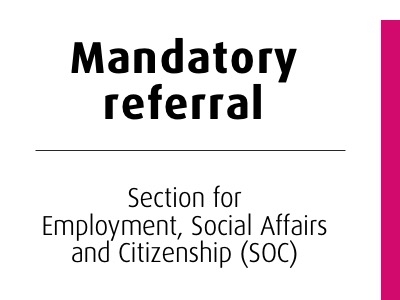European Economic
and Social Committee
European Works Councils
Background
European Works Councils (EWCs) are bodies representing EU employees of larger multinational companies which are created on either employees’ or central management’s initiative. They are designed to ensure workers are informed and consulted by management on the progress of the business and any significant decisions at EU level that could affect their working or employment conditions. Effective information and consultation with employees on crucial company decisions can help in anticipating and managing changes, such as those related to the green and digital transitions, addressing labour shortages or implementing new technologies.
Principle 8 of the European Pillar of Social Rights highlights the importance of social dialogue and workers’ involvement. Workers’ right to information and consultation within undertakings is also enshrined in Article 27 of the EU Charter of Fundamental Rights and is a right that must be duly implemented and effectively enforced across the EU.
There are more than a thousand transnational information and consultation bodies, most of which are EWCs, representing millions of workers in the EU. They were first established following a 1994 Council Directive. In 2009, a recast Directive was adopted, through which the European Commission sought to ensure the effectiveness of employees’ transnational information and consultation rights, foster the creation of new EWCs and enable the existing ones to continue functioning.
Following the 2023 call from the European Parliament to strengthen the role and capacity of EWCs, in January 2024, the Commission proposed a revision of the 2009 recast Directive to improve the effectiveness of the framework for the information and consultation of employees at transnational level, which the EESC welcomed in this opinion.
The current Commission proposal is based on a comprehensive evaluation and in-depth studies of the current legal situation and the practices of established EWCs. It provides substantial proposals for legal clarifications and changes, while aiming to further develop the broadly accepted positive effects of cross-border information and consultation of employees in a transnational context. It also aims to improve the role of EWCs in developing a trust-based social dialogue culture in companies which fosters competitiveness and quality jobs, which the EESC acknowledged and endorsed.
However, due to divergent views raised by employers’ organisations, members of the EESC Employers’ Group tabled a counter-opinion. More specifically, they expressed concerns that the revision of the Directive could complicate the functioning of EWCs and risk transforming them from effective channels for company-level information and consultation into sources of disputes and legal uncertainty. The EESC Employers’ Group believes this could potentially undermine the cooperation and trust that is essential in the workplace. The counter-opinion was rejected by the EESC but received more than a quarter of the votes cast; therefore, in line with the EESC Rules of Procedure, it is appended to the opinion.
Key points
In the opinion, the EESC:
- recognises the aim of increasing the effectiveness and implementation of EWC rights to provide legal certainty by clarifying key concepts of the EWC Directive. This especially concerns the definition of transnationality, appropriate resources available to EWCs, access to justice and increasing the Member States’ commitment to provide for effective and sufficiently dissuasive sanctions for infringements of EWC rights;
- is pleased by the Commission’s aims to revise the standard for a more efficient and meaningful information and consultation process by proposing additions to the subsidiary requirements, to increase the frequency of regular EWC meetings and to introduce a reasoned response by management to EWC opinions;
- supports important amendments regarding the ability of EWCs and their members to fulfil their duties. This concerns in particular resources to be provided by management, the details of which have to be jointly determined in the relevant EWC agreement in connection to training, experts and legal representation and the intended clarifications on confidentiality.
The text of the EESC opinion can be found here.
Additional information
Section: Employment, Social Affairs and Citizenship (SOC)
Opinion number: SOC/791
Opinion type: Mandatory referral
Rapporteur: Sophia Reisecker
Reference: COM (2024)14 final
Date of adoption by section: 23/5/2024
Result of the vote: 51 in favour/32 against/1 abstention
Date of adoption in plenary: 30/5/2024
Result of the vote: 128 in favour/101 against/12 abstentions (members of the EESC Employers’ Group tabled an amendment in the form of a counter-opinion, which was rejected but received more than a quarter of the votes cast: 104 in favour/125 against/11 abstentions. It is published in the annex of the opinion.)
Contacts:
Press officer: Simran Grewal/Laura Lui
Tel.: 00 32 2 546 9189
Email: Simran.Grewal@eesc.europa.eu /laurairena.lui@eesc.europa.eu
Administrator: Bartek Bednarowicz
Tel.: +32 2 546 9229
Email: Bartek.Bednarowicz@eesc.europa.eu
